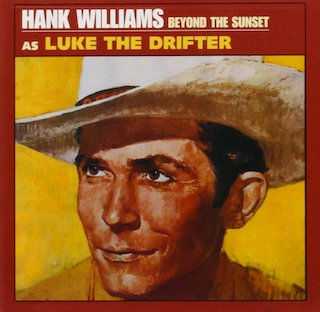
Hiram "Hank" Williams was a celebrated American singer, songwriter, and musician. He is regarded as one of the most significant and influential American singers and songwriters of the 20th century. Williams recorded 55 singles that reached the top 10 of the Billboard Country & Western Best Sellers chart, five of which were released posthumously, including 12 that reached No. 1, three of which were released after his death.

"Hey, Good Lookin'" is a 1951 song written and recorded by Hank Williams, and his version was inducted into the Grammy Hall of Fame in 2001. In 2003, CMT voted the Hank Williams version No. 19 on CMT's 100 Greatest Songs of Country Music. Since its original 1951 recording it has been covered by a variety of artists.

"I Saw the Light" is a country gospel song written by Hank Williams. Williams was inspired to write the song while returning from a concert by a remark his mother made while they were arriving in Montgomery, Alabama. He recorded the song during his first session for MGM Records, and released in September 1948. Williams' version did not enjoy major success during its initial release, but eventually it became one of his most popular songs and the closing number for his live shows. It was soon covered by other acts, and has become a country gospel standard.
"Ramblin' Man" is a song written in 1951 by Hank Williams. It was released as the B-side to the 1953 number one hit "Take These Chains from My Heart", as well as to the 1976 re-release of "Why Don't You Love Me". It is also included on the 40 Greatest Hits, a staple of his CD re-released material.
"Honky Tonkin'" is a 1947 country music song, written and recorded by Hank Williams. His song went to #14 on the Billboard country music chart in 1948. In 1982, it became the sixth chart topping single for Williams' son, Hank Williams Jr.
"Mind Your Own Business" is a 1949 song written and originally performed by Hank Williams.
"Men with Broken Hearts" is a song written and recorded by Hank Williams under the pseudonym "Luke the Drifter." It was released on MGM Records in 1951.

"I Can't Help It (If I'm Still in Love with You)" is a song written and originally recorded by Hank Williams on MGM Records. It hit number two on the Billboard country singles chart in 1951. In his autobiography, George Jones printed the first six lines of the song and stated, "Its lyrics couldn't be more simple - or profound."
There'll Be No Teardrops Tonight is a song written by Hank Williams and released on MGM Records as the B-side to "Mind Your Own Business" in July 1949.
"I Could Never Be Ashamed of You" is a song written and recorded by Hank Williams. It was released as the B-side of "I'll Never Get Out of This World Alive" on MGM Records in November 1952.

Hank Williams as Luke the Drifter is an LP by Hank Williams released by MGM Records in 1954. It features narrations that Williams released under the pseudonym Luke the Drifter.
Pictures from Life's Other Side" is a traditional song popularized by Hank Williams under the pseudonym "Luke the Drifter." It was released on MGM Records in 1951.
"The Funeral" is a song credited to Hank Williams with words from Will Carleton. It was released as a single under the pseudonym Luke the Drifter by MGM Records in 1950.

"Just Waitin" is a song written by Hank Williams and released as the A-side of "Men with Broken Hearts" in 1951 on MGM Records. It was released under the pseudonym "Luke the Drifter."
"Beyond the Sunset" is a song written by Blanche Kerr Brock, Virgil P. Brock, and Albert Kennedy Rowswell. It was released as a single by Hank Williams under the pseudonym Luke the Drifter in 1950.

"Too Many Parties and Too Many Pals" is a song released by Hank Williams under the pseudonym Luke the Drifter. The song dates back to at least 1926 when it was recorded by a number of artists including the Bar Harbor Society Orchestra. It had also previously been recorded and released in 1948 by Bill Haley as Bill Haley and the 4 Aces of Western Swing; this was Haley's first professionally released single.
"Help Me Understand" is a song written by Hank Williams and released under the name "Luke the Drifter" on MGM Records in 1950.

"A Home in Heaven" is a hymn written by Hank Williams and recorded as a duet with his wife Audrey Williams. It was released as a single on MGM Records in 1956.
"Lost on the River" is a song written by Hank Williams. It was released as a duet with his wife Audrey Williams on MGM Records in 1950.
"Be Careful of Stones that You Throw" is a song recorded by Hank Williams. It was written by Bonnie Dodd.







